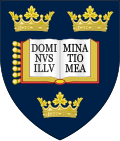Philip Bale (died 1559) was an Oxford college head in the 16th-century. [1] [2]
Bale was educated at Exeter College, Oxford; and was Rector of Exeter College, Oxford, from 1521 to 1526. He held the living at St Michael, Honiton and St Nicholas, Combe Raleigh. [3] He left patristic works, and books of Bede, to the college. [4]
